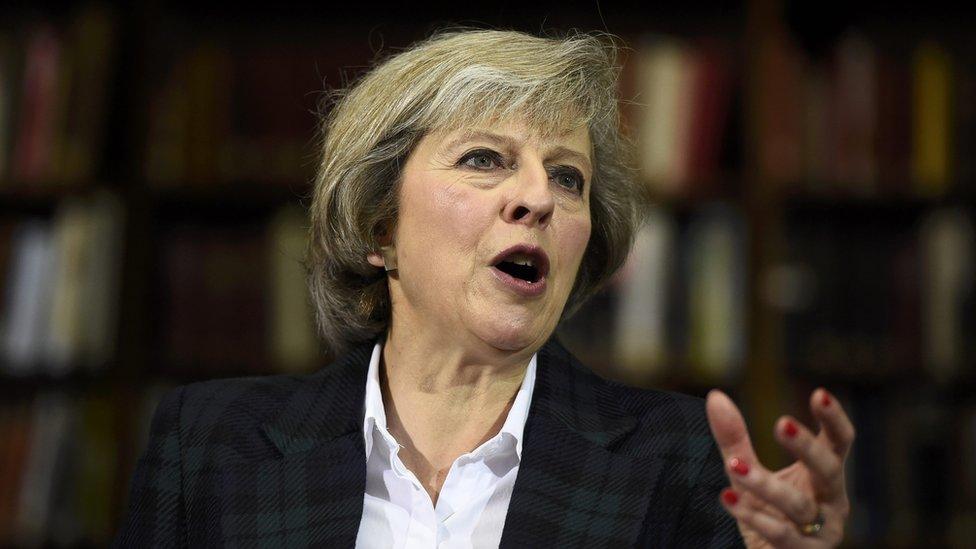Tory leadership choice will define UK-EU relationship
- Published

Mrs May's stance on free movement appears to vary from other leadership contenders
Put aside for a moment the Shakespearian psychodrama of the Tory leadership contest.
For a key difference has opened up between the contenders that could have a huge impact on Britain's future relationship with the EU after Brexit.
Michael Gove has made clear that if he becomes prime minister, he would not allow the free movement of EU workers within the UK.
The justice secretary said: "I will end free movement, introduce an Australian-style points-based system for immigration, and bring numbers down. With my leadership, it will be delivered."
And although his 5,000-word speech did not mention the single market, his staff are clear that by ending free movement, that also means taking Britain out of the single market entirely.
During the referendum campaign, Mr Gove said that he wanted the UK to be "outside the single market but have access to it".
This is a position shared by former defence secretary Liam Fox, who said: "I do not believe there is room for membership of the single market if it entails free movement of people. Those who voted to leave the EU would regard it as a betrayal."
Energy Minister Andrea Leadsom is in a similar place.
She told her constituents in a letter: "We must not tie ourselves to a single market but seek all the global opportunities that would open to us if once again we were able to negotiate our own trade arrangements."
In contrast, Theresa May appears more willing to argue that Britain must retain some membership of the single market while at the same time partially curbing the free movement of people.
In her launch speech, the home secretary said: "While the ability to trade with EU member states is vital to our prosperity, there is clearly no mandate for a deal that involves accepting the free movement of people as it has worked hitherto.
"As we conduct our negotiations, it must be a priority to allow British companies to trade with the single market in goods and services but also to regain more control over the numbers of people coming here from Europe."
So the principle of free movement of people should continue in some form, just not "as it has worked hitherto" and there should be "more control" over the numbers coming.
And trade in goods and services "must be a priority", something that appears possible only with some retained membership of the single market.
Wrong assumption
On one level, this shows that there is a real policy choice in this leadership contest: It is not just a beauty parade.
But on another level, it shows that it is wrong to assume, as many have, that our future trading relations with the EU are something that will be decided in the years to come.
The narrative has been about how the Article 50 withdrawal negotiations will be pushed back until at least 2017.
There are five contenders in the Tory leadership race
The EU Trade Commissioner, Cecila Malmstrom, said on Newsnight a future trade deal could be agreed only once the UK had untangled itself from the EU and its red tape. The talk has been of how the EU-Canada trade deal took seven years and still has not been ratified.
Yet the Tory leadership contenders are establishing negotiating positions now, positions that that will become hardened as the contest proceeds, as the views of Conservative MPs, party members, and the think tanks are brought to bear.
Things that are said in the rough and tumble of a leadership race will be crawled over by EU leaders and diplomats and used in the negotiations to come.
So there is a real choice before the 100,000 plus Tory members who will decide this contest.
And their decision will affect us all, not just by determining our next prime minister but also our future relationship with the EU.